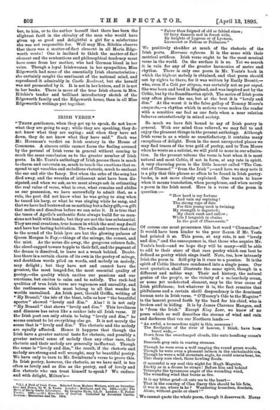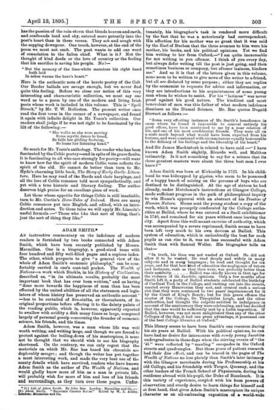IRISH VERSE.*
"THESE gentlemen, when they get up to speak, do not know what they are going to say ; while they are speaking, they do not know what they are saying ; and when they have sat down, they do not know what they have said." Such was Mr. Horsman's verdict on Irish oratory in the House of Commons. A sincere critic cannot focus the feeling aroused by the perusal of Irish verse in general without coming to much the same conclusion as to the greater number of Irish poets. In Mr. Yeats's anthology of Irish poems there is much to charm and entertain us, much to touch the emotions that re- spond to apt vocables and melodious rhetoric, much to enchant the ear and stir the fancy. But when the echo of the song has died away, and the wreaths of iridescent mist have been dis- sipated, and when we ask, as we must always ask in estimating the real value of verse, what is over, what remains and abides as our possession, we have sorrowfully to admit that, as a rule, the poet did not know what he was going to sing when he tuned his harp, or what be was singing while he sang, and that we have had bestowed on us nothing but a fairy gift,—a gift that melts and dissolves before we can seize it. It is true that the tones of Apollo's authentic flute always build for us man- sions not built with hands; but they are not the less substantial. They are real creations, true homes in which the soul may dwell and have her lasting habitation. The walls and towers that rise to the sound of the Irish lyre are but the glowing palaces of Queen Morgan le Fay,—things of the mirage, the sunset, and the mist. As the notes die away, the gorgeous colours fade, the cloud-capped towers topple to their fall, and the pageant of the dream is dissolved, to leave not a wrack behind. Doubt- less there is a certain charm of its own in the poetry of mirage, and doubtless words piled on words, and melody on melody, may delight ; but they have not and cannot have the greatest, the most longed-for, the most essential quality of poetry,—the quality which excites our passions and our emotions, but excites to calm and to satisfy. The rock-bed qualities of true Irish verse are vagueness and unreality, and the restlessness which must belong to all that wander in worlds unrealised. An Irish poet, Gerald Griffin, writing of " Hy Brasail," the isle of the blest, tells us how " the beautiful spectre" showed "lovely and dim." Alas ! it is not only "Hy Brasail" that shows "lovely and dim." This loveliness and dimness has eaten like a canker into all Irish verse. If the Irish poet can only attain to being "lovely and dim," he seems content to let everything else go. It is not merely the sense that is "lovely and dim." The rhetoric and the melody are equally affected. Hence it happens that though the Irish have a greater natural taste for rhetoric, and possibly a greater natural sense of melody than any other race, their rhetoric and their melody are generally ineffectual. Though the sense is "lovely and dim," the result, if the rhetoric and melody are strong and well wrought, may be beautiful poetry. We have only to turn to Mr. Swinburne's verse to prove this. In Irish poetry, however, the rhetoric, as we have said, is too often as lovely and as dim as the poetry, and of lovely and dim rhetoric who can trust himself to speak P We endure, and with delight, Milton's- • (1.) A Book of Irish Verse. Selected from Modern Writers, with an Introduc- tion and Notes, by W. B. Yeats. London : Methuen and Co. 1895.—(2.) The Store of Early Gaelic Literature. By Douglas Hyde, LL.D. London : T. Fisher Unwio. 1895.—(3.) Hero-Tales of Irok•nd. Collected by Jeremiah Curtin. London: Macmillan and Co. 1894.
" Fairer than feigned of old or fabled since ; Of fairy damsels met in forest wide, By knights of Logress or of Lyoness, Launcelot or Nikes or Pellenore."
We positively shudder at much of the rhetoric of the Irish poets. Horresco referens. It is the same with their
metrical artifices. Irish verse ought to be the most musical verse in the world. On the surface it is so. Yet we search it in vain for any of the greater harmonies of metre and rhythm. There is only one poem in Mr. Yeats's book in which the highest melody is obtained, and that poem should not by rights be there, for it was written by Emily Bronte,
who, even if a Celt per stirpens, was certainly not so per caput. She was born and bred in England, and was inspired not by the
Celtic, but by the Scandinavian spirit. The metre of Irish poets may often please the ear, but at the best it is "lovely and dim." At the worst it is the false gallop of Tommy Moore's anapa3sts,—a rhythm which in serious verse makes the reader with a sensitive ear feel as one feels when a near relation behaves ostentatiously in mixed society.
So much we have felt bound to say of Irish poetry in general. With our mind thus relieved, we may fall to and enjoy the pleasant things in the present anthology. Although
Irish verse is as a whole so unsatisfactory, it contains many exceptions of delight. Even in the most unexpected places we
may find traces of the true gold of poetry, and to Tom Moore when he wrote as a satirist, we will yield to none in our admira-
tion. In the present volume the verse is best when it is most natural and most Celtic, if not in form, at any rate in spirit. A very charming poem is the little lament called "The Con- vict of Clonmel" "from the Irish ";—and here we may note it is a pity that this phrase so often to be found in Irish poetry- books, is not more closely explained. One wants to know when it means translation, when paraphrase, and when merely a poem in the Irish mood. Here is a verse of the poem in question :— "How hard is my fortune And vain my repining !
The strong rope of fate For this young neck is twining.
My strength is departed;
My cheek sunk and sallow ;
While I languish in chains In the gaol of Cluanmeala."
Of course one must pronounce this last word " Clonmallow." It would have been kinder to the poor Saxon if Mr. Yeats had printed it so. This poem, at any rate, is not "lovely and dim," and the consequence is, that those who acquire Mr. Yeats's book—and we hope they will be many—will be able to add to their store of that rare poetry which can best be defined as poetry which sings itself. Note, too, bow intensely Irish the poem is. Self-pity in it rises to a passion. It is the spirit of Celtic literature condensed into a single poem. Our next quotation shall illustrate the same spirit, though in a different and nobler way. Their sad history, the natural genius of the people, or the vicinity of a melancholy ocean, or some yet undetected element, may be the true cause of Irish pitifulness ; but whatever it is, the fact remains that pitifulness and a certain shrill despondency is the dominant human note in Irish verse. " O'Hussey's Ode to the Maguire" is the lament poured forth by the bard for his chief, who is broken and in hiding. It is by James Clarence Mangan, and is "from the Irish." Except King Lear, we know of no poem which so well describes the storms of wind and rain and darkness that vex our Northern lands :— " An awful, a tremendous night is this, meseems !
The floodgates of the river of heaven, I think, have been burst wide,— Down from the overcharged clouds, like unto headlong ocean's d
Descends grey rain in roaring streams.
Though he were even a wolf ranging the round green woods, Though he were even a pleasant salmon in the unchainable sea, Though he were a wild mountain eagle, he could scarce bear, he, This sharp sore sleet, these howling floods.
O mournful is my soul this night for Hugh Maguire, Darkly as in a dream he strays ! Before him and behind Triumphs the tyrannous anger of the wounding wind, The wounding wind that burns as fire.
It is my bitter grief—it cuts one to the heart— That in the country of Clan Darry this should be his fate, 0 woe is me, where is he P Wandering houseless, desolate, Alone, without guide or chart t "
We cannot quote the whole poem, though it deserves it. Never has the passion of the rain-storm that blends heaven and earth, and confounds land and sky, entered more potently into the poet's heart than in these verses. They sob and sough with the sopping downpour. One touch, however, at the end of the poem we must not omit. The poet wants to add one word of consolation to the fallen chief. What is it P Not the thought of kind deeds or the love of country or the feeling
that his sacrifice is saving his people. No!—
"But the memory of the lime-white mansions his right hand hath laid In ashes warms the hero's heart."
Here is the authentic note of the heroic poetry of the Celt. Our Border ballads are savage enough, but we never find quite this feeling. Before we close our notice of this very interesting and characteristic collection, we must say one word as to a poem by one of the modern and living Irish poets whose work is included in this volume. This is " Spell Struck," by Mr. T. W. Rolleston. The present writer once read the first verse in the corner of a newspaper, and found it again with infinite delight in Mr. Yeats's collection. Our readers shall judge if he was not right to be fascinated by the lilt of the following :—
" She walks as she were moving Some mystic dance to tread, So falls her gliding footstep, So leans her listening heal."
So much for Mr. Yeats's anthology. The reader who has been fascinated by the Celtic poetry—and in spite of its grave faults, it is fascinating to all who care strongly for poetry—will want to know how far the spirit of modern Celtic verse reflects the spirit of the old. He cannot do better than turn to Mr. Hyde's charming little book, The Story of Early Gaelic Litera- ture. Here he may read of the Bards and their harpings, and all the lore of Celtic romance told most sympathetically, and yet with a true historic and literary feeling. The author
deserves high praise for an excellent piece of work.
Let those whose appetite for things Celtic is still insatiable, turn to Mr. Curtin's Hero-Tales of Ireland. Here are many Celtic romances put into English, and edited, with an intro-
duction and notes. To these tales we will apply Mr. Lincoln's useful formula :—" Those who like that sort of thing, that's just the sort of thing they like."



































 Previous page
Previous page